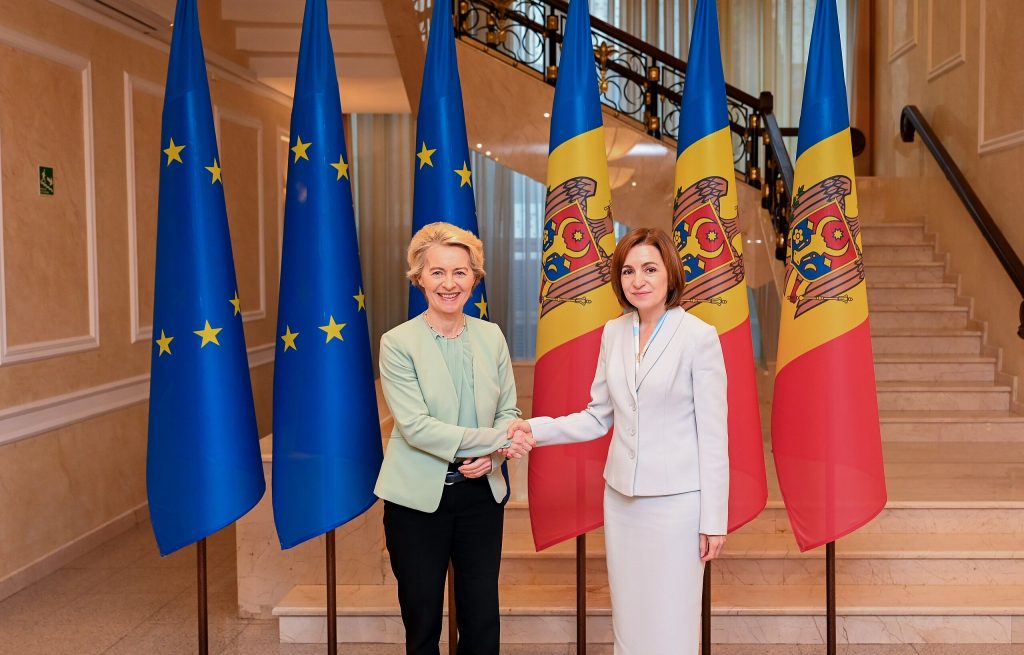Moldova at a Crossroads: Russia’s “all in” against Chișinău’s European Future
With its European aspirations hinging on the parliamentary elections on September 28, Moldova is approaching a pivotal moment. Will the country take a historical opportunity to secure a future within the European Union (EU) – or will it remain under the influence of the Russian Federation?
While Russia has militarily invaded Ukraine, Moldova is facing an unprecedented hybrid war orchestrated by the Kremlin. Experts believe that Moscow is likely to invest significantly in efforts to manipulate the country’s upcoming parliamentary elections, attempting to win the “hearts and minds” of Moldovans through extensive cyberattacks and traditional tactics such as co-opting local politicians who have long been connected to illicit Russian funding.
For Russia, the stakes in the September election are incredibly high. If it loses the political contest for Moldova, that would be detrimental to its greater strategy. After all, it is to be expected that another four-year term of a pro-European government would set Moldova’s EU accession in motion by around 2030. If Moldova stays on the European path with a completely pro-European majority in power, this would increase the pace of the reforms that have been already initiated; if the future governing coalition turns out to be a mix of pro-European and some more skeptical groups, this could obstruct or even sabotage progress; and in the worst-case scenario of pro-Russian forces coming to power, the reforms could be completely abandoned, with Moldova returning to oligarchic rule and being governed by people in the orbit of the Kremlin’s interests.
In light of these factors, Russia is likely to go “all in”. Authorities in Chișinău estimate that Moscow is willing to invest about 200 million euros in what could be the most extensive electoral campaign ever conducted in Moldova. Should this prove to be true, the Russian investment could amount to roughly twice the size of Moldova’s defence annual budget of around 100 million euros, indicating that the Kremlin has serious intentions to steer Moldova away from its European path.
Maia Sandu, the main target of Russian propaganda attacks
Maia Sandu, the current president of Moldova, is once again at the center of Russian propaganda attacks due to her popularity among Moldovans. After winning re-election last fall, the founder and leader of the Action and Solidarity Party (PAS) remains a key figure in promoting Moldova’s European integration. However, Sandu faces vulnerabilities that Russia can exploit. For example, there are growing frustrations about the lack of progress made in justice reform under her administration – and there have been only few convictions of those high-profile oligarchs responsible for plundering the country in recent years.
The pro-European PAS has also struggled to effectively communicate the challenges Moldova faced in recent years, including the COVID-pandemic, an energy crisis instigated by Russia, and economic issues stemming from Russia’s invasion of Ukraine. These factors have severely impacted Moldova’s fragile economy, resulting in “an inflation increase not seen in over 20 years,” according to the Bertelsmann Transformation Index (BTI). All of that has created a fertile breeding ground for false narratives and Russian propaganda.
According to a report by the Finnish software and methodologies company CheckFirst, Moldova is a primary target of Operation “Overload,” a large-scale campaign of Foreign Information Manipulation and Interference (FIMI) that promotes narratives aligned with the Kremlin’s political agenda. This operation gained traction in Moldova after April 2025 and specifically targeted Maia Sandu with a gender-based disinformation and smear campaign.
The main narratives against Maia Sandu center on accusations of corruption and her ties to the LGBTQ+ community, aimed at provoking a backlash among the conservative segments of society. Additionally, Sandu is portrayed as a puppet of the West with plans to unify Moldova with Romania.
While these tactics are not new, researchers at CheckFirst have noted that the use of artificial intelligence to spread such messages on social media has expanded significantly, reaching a broader audience than before – especially on TikTok and Telegram, but also on Facebook.
At the beginning of 2025, Moldova had 2.42 million internet users, representing an internet penetration rate of 80.2 percent. Of these users, 1.18 million actively use TikTok, which reported that its ads reached 51.1 percent of all adults aged 18 and older in Moldova at that time. Telegram is also a widely used platform in Moldova for disseminating Russia’s false narratives and smear campaigns against the pro-European leadership. Associates of fugitive oligarch Ilan Shor often coordinate these campaigns, according to a recent analysis by the Atlantic Council’s Digital Forensic Research Lab (DFRLab).
Compared to previous years, state institutions have shown greater resilience in handling these aggressive tactics by malign actors. However, they remain insufficiently equipped to counter the sophisticated methods that Russia employs on social media, including financial incentives for influencers, as was seen during the presidential elections in neighboring Romania.
The “Fifth Column” at Full Speed
On the political front, Moscow aims to consolidate its forces into several political blocs that will draw votes from the left, center-left, and undecided voters. First and foremost, the Kremlin is focusing on the Socialist and Communist bloc, led by former pro-Russian president Igor Dodon. Recently, two smaller parties – The Heart of Moldova and The Future of Moldova – have joined this bloc, each polling around 2 to 3 percent. Moscow’s goal is to ensure that no votes from the left are wasted on these smaller parties, which are unlikely to surpass the 5 percent electoral threshold.
In the center, there is the Alternativa bloc, which is effectively led by Chișinău’s mayor Ion Ceban. Ceban has historically aligned himself with pro-Russian forces but has recently attempted to rebrand himself as pro-European. However, as a recent travel ban imposed by Romania – preventing Ceban from entering the Schengen area – has revealed, this apparent shift might ultimately be a façade.
The leadership of the Alternativa bloc also includes individuals with past connections to the pro-Russian party, such as Mark Tkaciuk, a former advisor to communist president Vladimir Voronin; Alexandr Stoianoglo, a former prosecutor dismissed due to allegations of serious corruption; and former prime minister Ion Chicu, who has the backing of the Party of Socialists under the leadership of Igor Dodon.
Finally, Moscow is also supporting the Pobeda bloc, currently led by fugitive oligarch Ilan Shor, who was sentenced to 15 years in prison in Moldova in 2023. The Central Electoral Commission recently disqualified the Pobeda bloc from the elections following Shor’s declaration at the bloc’s last congress in Moscow on July 6, where he announced his campaign for the unification of Moldova with the Russian Federation. It remains uncertain how the votes from Shor’s political network – financed by Kremlin money and estimated to account for about 8 percent of the total votes – will be distributed after the bloc’s removal from the race. However, political analysts estimate that these votes will be split between the Socialist and Communist bloc and Alternativa.
Kyiv and Bucharest: Maximum Security Stakes
The upcoming parliamentary elections in Moldova are expected to draw keen attention from both Kyiv and Bucharest, its neighboring countries. For Ukraine, it is crucial that a genuinely pro-European government remains in power in Chișinău. The emergence of pro-Russian forces could pose a significant threat, potentially leading to the “Belarusification” of Moldova and its use as a base for attacks against Ukraine, including the breakaway region of Transnistria, which is de facto controlled by Moscow.
A pro-Russian and adversarial Moldova could enable Russia to advance towards the Odessa region from two directions, effectively cutting off Ukraine’s access to the sea – a scenario that would be unacceptable for Kyiv. Romania also has a direct stake in Moldova, as over 800,000 of its citizens – approximately 30 percent of Moldova’s total population of 2.6 million – reside there.
As a NATO and EU border country, Romania would face increased security challenges and uncertainty along Euro-Atlantic borders should a pro-Russian regime take hold in Chisinau.
These factors contribute to Moldova becoming a focal point this fall, where the electoral contest will also have significant geopolitical implications between East and West.
The outcome will shape the country’s future for years to come – and all parties involved are expected to deploy considerable resources in this struggle. Nevertheless, the ultimate decision regarding Moldova’s future will rest solely in the hands of its citizens.
First published by TVR Moldova


Thanks for this detailed and insightful analysis!